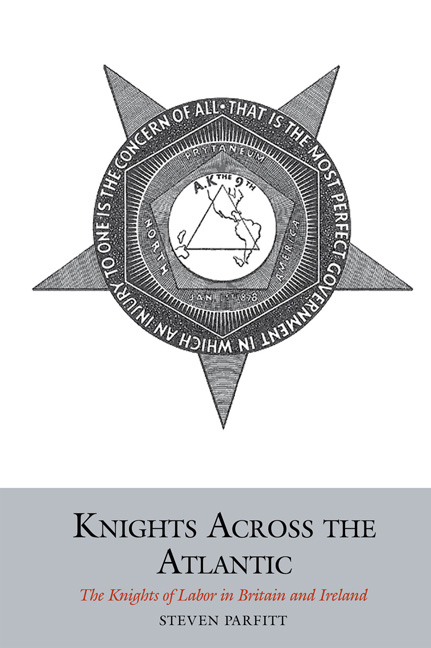Book contents
- Frontmatter
- Contents
- Acknowledgements
- Introduction: The World of the Knights of Labor
- 1 Origins
- 2 The Rise of a Transnational Movement
- 3 Organisation, Culture and Gender
- 4 The Knights in Industry
- 5 The Knights and Politics
- 6 The Knights and the Unions
- 7 The Fall of a Transnational Movement
- Conclusion: The Knights of Labor in Britain and Ireland
- Appendix: List of Known Assemblies of the Knights of Labor in England, Scotland, Wales and Ireland
- Bibliography
- Index
7 - The Fall of a Transnational Movement
- Frontmatter
- Contents
- Acknowledgements
- Introduction: The World of the Knights of Labor
- 1 Origins
- 2 The Rise of a Transnational Movement
- 3 Organisation, Culture and Gender
- 4 The Knights in Industry
- 5 The Knights and Politics
- 6 The Knights and the Unions
- 7 The Fall of a Transnational Movement
- Conclusion: The Knights of Labor in Britain and Ireland
- Appendix: List of Known Assemblies of the Knights of Labor in England, Scotland, Wales and Ireland
- Bibliography
- Index
Summary
On 31 December 1889, the members of LA443 in Bootle met with their wives and friends to bring in the New Year. As the band played, and as the partiers danced, the assembly seemed secure and the new decade seemed to promise only better things to come. LA443 planned to open new preceptories in various parts of Liverpool, and these would in time become assemblies themselves. Knights elsewhere in Britain and Ireland approached the new decade with similar optimism. New recruits swelled the ranks of the Scottish assemblies. Knights secured a strong foothold in Belfast and Derry. The assemblies in the Black Country seemed to be overcoming earlier problems with local trade unions, and LA454 of Walsall in particular led a powerful local political and industrial movement. Assemblies in Rotherham, even in Derby, grew rapidly in size and number. The total membership of the British and Irish assemblies at this time stood between 10,000 and 15,000. But these assemblies had all disappeared by 1894, except for one or two that struggled on for another year or two. Only four years separated their peak from their end.
Many of the causes of this decline have appeared in earlier chapters. Secrecy and ritual were not to everyone's taste. The insistence of many Knights on arbitration regardless of context often caused problems, either with employers who refused to negotiate or with workers, often members, who preferred to strike whether it be under the Order's banner or not. Sometimes, when Knights led them and they failed, these strikes destroyed assemblies; sometimes assemblies were crippled when their leaders refused to countenance a strike. In some cases, employers were determined enough to keep the assemblies away altogether, as Pilkington's did most successfully and most consequentially for the history of LA3504. Most importantly of all, the assemblies invariably lost ground whenever they threatened the jurisdiction of a trade union with any national stature. In this chapter, we approach the question of the British and Irish assemblies’ decline from a wider, international point of view.
- Type
- Chapter
- Information
- Knights Across the AtlanticThe Knights of Labor in Britain and Ireland, pp. 196 - 222Publisher: Liverpool University PressPrint publication year: 2016



